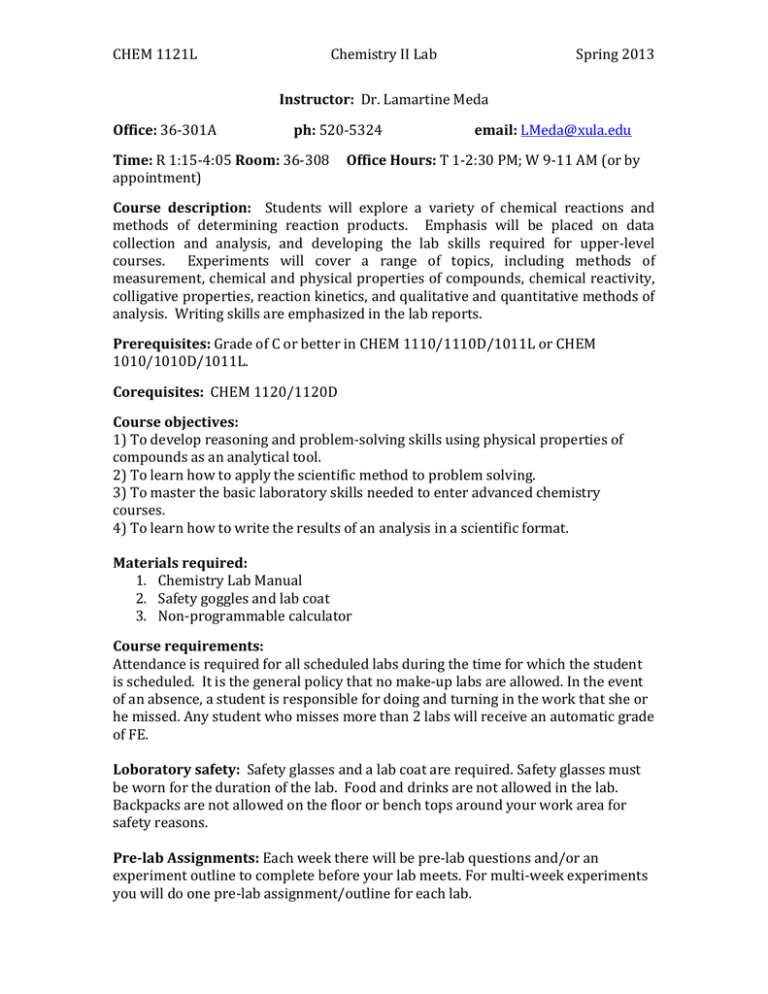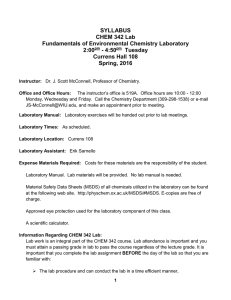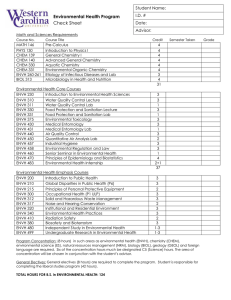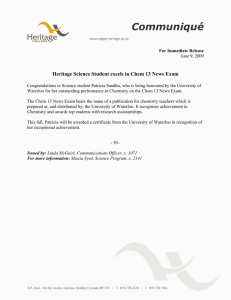CHEM 1121L Chemistry II Lab Spring 2013
advertisement

CHEM 1121L Chemistry II Lab Spring 2013 Instructor: Dr. Lamartine Meda Office: 36-301A ph: 520-5324 Time: R 1:15-4:05 Room: 36-308 appointment) email: LMeda@xula.edu Office Hours: T 1-2:30 PM; W 9-11 AM (or by Course description: Students will explore a variety of chemical reactions and methods of determining reaction products. Emphasis will be placed on data collection and analysis, and developing the lab skills required for upper-level courses. Experiments will cover a range of topics, including methods of measurement, chemical and physical properties of compounds, chemical reactivity, colligative properties, reaction kinetics, and qualitative and quantitative methods of analysis. Writing skills are emphasized in the lab reports. Prerequisites: Grade of C or better in CHEM 1110/1110D/1011L or CHEM 1010/1010D/1011L. Corequisites: CHEM 1120/1120D Course objectives: 1) To develop reasoning and problem-solving skills using physical properties of compounds as an analytical tool. 2) To learn how to apply the scientific method to problem solving. 3) To master the basic laboratory skills needed to enter advanced chemistry courses. 4) To learn how to write the results of an analysis in a scientific format. Materials required: 1. Chemistry Lab Manual 2. Safety goggles and lab coat 3. Non-programmable calculator Course requirements: Attendance is required for all scheduled labs during the time for which the student is scheduled. It is the general policy that no make-up labs are allowed. In the event of an absence, a student is responsible for doing and turning in the work that she or he missed. Any student who misses more than 2 labs will receive an automatic grade of FE. Loboratory safety: Safety glasses and a lab coat are required. Safety glasses must be worn for the duration of the lab. Food and drinks are not allowed in the lab. Backpacks are not allowed on the floor or bench tops around your work area for safety reasons. Pre-lab Assignments: Each week there will be pre-lab questions and/or an experiment outline to complete before your lab meets. For multi-week experiments you will do one pre-lab assignment/outline for each lab. CHEM 1121L Chemistry II Lab Spring 2013 Laboratory Lecture: Each week, at the beginning of lab, there will be a pre-lab lecture of important information for the experimental work of the day. Be on time to hear the pre-lab lecture. Course evaluation: Each week students will take a quiz covering the experiment they did the previous week. Quizzes will be worth 20 pts each and will be administered before each experiment. Each student will also write a report on each experiment and complete any post-lab questions/homework assignments. Reports and questions will be worth 50 points. There will be a comprehensive final exam worth 200 points. Course grades will be assigned on a 10-point scale: A 90-100% B 80-89% C 70-79% D 60-69% F below 60% CELL PHONES, PAGERS, iPODS AND OTHER SIMILAR ELECTRONIC DEVICES ARE NOT ALLOWED IN THE LABORATORY. FAILURE TO COMPLY WITH THIS RULE WILL RESULT IN YOUR REMOVAL FROM THE ROOM. Academic Misconduct The following statement is found in the Xavier Faculty Handbook: If a student's test, examination paper, laboratory report, term paper, or other written assignment gives evidence of not being completely his/her own work, he/she may be given an F for the course. A student who communicates with anyone during the course of an examination or test, unless he does so with the permission of the instructor, may be immediately dismissed from the room and given an F. Such communication includes attempts to read from another's paper. If a student is found to have brought study materials into the examination room without the instructor's permission, it may be assumed that he/she intended to use such materials unlawfully, and he/she may be penalized accordingly. Any form of academic misconduct will not be tolerated. Most students have a pretty good idea of what is considered cheating on an exam or quiz. However, many have a hard time distinguishing what is acceptable from what is not acceptable when it comes to writing reports in this course. A few things to keep in mind: 1) It is never acceptable to falsify lab data. If, while analyzing the results of your experiment, you determine that your data cannot be correct, do not change it! It is expected that you will, on occasion, not successfully perform an experiment and that your data will not be correct. When this is the case you should focus on trying to explain what might have gone wrong. 2) Do not use someone else's report as a guide for how to do your own report. Your report MUST be your own work. Even if you don't "copy" someone's report, looking at it to get ideas for writing your own is not acceptable. Keep in mind, also, that in CHEM 1121L Chemistry II Lab Spring 2013 such situations the person who allows someone to look at his or her paper or who provides answers to others in some other way is considered equally guilty. Lab schedule: CHEM 1121L Chemistry II Lab Spring 2013 Date Experiment Jan 17 Solution and Net Ionic Equations Jan 24 Aqueous Reactions Jan 31 Group 1-Week 1 Feb 7 Group 1-Week 2 Feb 14 Le Chatelier’s Principle Feb 21 Group 3-Week 1 Feb 28 Group 3-Week 2 March 7 Colligative Properties March 14 Colligative Properties, cont. March 21 Acid/Base Titration March 28 Easter Holiday (No Class) April 4 Synthesis and Characterization of an Iron Oxalate Complex April 11 Iron Oxalate cont. April 18 Electrochemistry April 25 Final Exam





